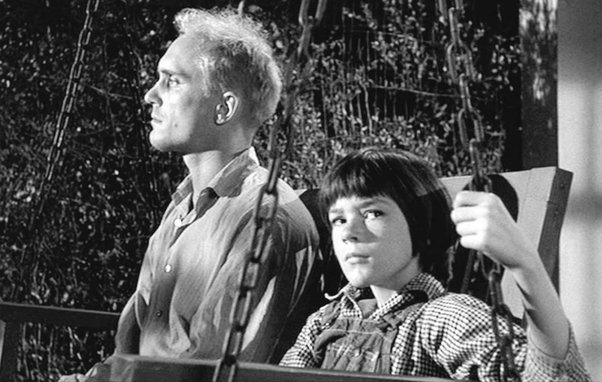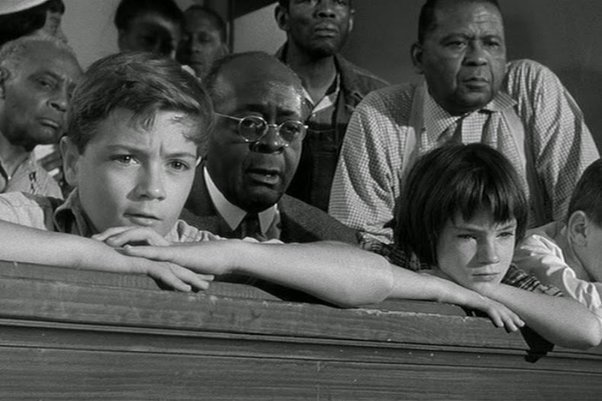A byproduct of focusing on a list of the most critically acclaimed movies is that there’s something about critically acclaimed movies that feels like homework. The feeling is intensified when you’re looking at a movie based on a book that is literally homework for most American students.
This is a movie so ingrained in pop quizzes and five-paragraph essays that it becomes difficult to see it as an entertaining work of art.
The experience of watching it this time, though, was pretty different for me. I got to enjoy it as a movie instead of something I had to write a report on. Ok, in a way, I am writing a report on it, but at least no one is grading me (I hope).
With this experience I finally got all the depth, nuance and great writing that my eighth grade teacher would have been proud I caught. You’re welcome Mrs. Collins!
So here we continue with our look at the top 100 AFI list with 1960’s To Kill a Mockingbird, written by Harper Lee and directed by Robert Mulligan.
A glimpse into humanity
The movie’s main theme comes from the title, or the lesson Atticus Finch teaches from the title: “it is important to see each other’s humanity.”
Much of this movie takes place in a racist town when a black man, Tom Robbins, is falsely convicted because racists will racist. And racism stems so much from an inability to see a person’s humanity and instead only see innumerable characteristics. The entire town is ready to believe Tom is guilty because they want to see him as a skin color instead of a person.
And this is great commentary on how people lose their own humanity when they do so. Group mobs are all about losing our own humanity, sacrificing it to the tribe (which is why, in my opinion, they’re almost all bad). Mr. Cunningham does this as the mob comes to the jail to get “justice” on Tom, with only Atticus in their way.
But then Scout does something amazing. She recognizes Mr. Cunningham, and brings up his life, causing him to remember his humanity. This causes him to become embarrassed and for the mob to remember their own identities, enough to disband said mob and go home.
This theme also comes up with my Boo, Boo. Everyone thinks the worst of him. But he proves he’s much more than some creep (who for some reason wants to pet Jim…but let’s forget that). He’s a good, caring person with a good heart. It takes humanity to see humanity.
Scout even learns this in various ways, even as she comes to understand that it’s ok for Walter to have syrup on his food.
The mockingbird story Atticus tells reinforces this. There’s no reason to kill something as innocent as a mockingbird because all it does is sing. We hang onto our own humanity by recognizing the humanity of the mockingbird. Or, I guess, um, bird-anity. You know what I mean!
Great characters
So many characters from these movies are iconic, but I don’t know if there are any who inspire people in an “oh I want to be that guy” sort of way as Atticus Finch.
He is written as someone who always strives to do the right thing. This can be annoying, a character who is so good; however, part of the magic is that he still feels real.
His kids, at least during the first half of the movie, think he’s not cool. They even call him Atticus instead of dad.
And although he’s always striving to do the right thing, he ultimately fails. I mean he does lose the court case.
He inspires others too, which I think getting to live vicariously through the characters he inspires makes us more connected. Scout becomes a deeper person because of him. Even the sheriff steps his game up by doing what he knows is the right thing.
Basing films off of books is tough. Basing films off what are considered the best books of all time seems like an experience to create nightmares.
If an adaptation is too far from the book, it is hated, and if an adaptation stays too close, it can fall flat because what works for one medium doesn’t necessarily work for another.
This movie finds a sweet balance by creating the magic of the book while also making it work for film. In this case, the magic is seeing Atticus and these events through the eyes of a child. It could have double-downed on the narration, but instead, it chooses the more subtle approach of continuously cutting to the faces and reactions of the kids (mainly Jim) throughout the movie.
This puts us in touch with him visually, and this connection does allow us to put back on those child glasses to look at Atticus.
Aside from this, it tells the story in a straightforward way, as a stream of events, taking all the time it needs in certain situations, like the courtroom scene, making it feel almost experimental.
The movie doesn’t try too hard to manipulate. It stays authentic, which is another reason it works so well as a film instead of a Frankensteined version of a book.
After this experience, I do have a whole new take on the film. I can now appreciate it the way people probably did at the time.
It’s unfortunate that this “homework effect” can potentially ruin great movies for people. However the good news is, you can approach it with fresh eyes and get the enjoyment you’re supposed to get from the films.
So don’t hate the movie if you used to have to do homework on it. Don’t shoot it. All it wants to do is sing you its sweet song. So kick back and enjoy its…bird-anity.
Thanks for reading!
Check out our streaming service: https://www.cideshow.com/subscribe/




